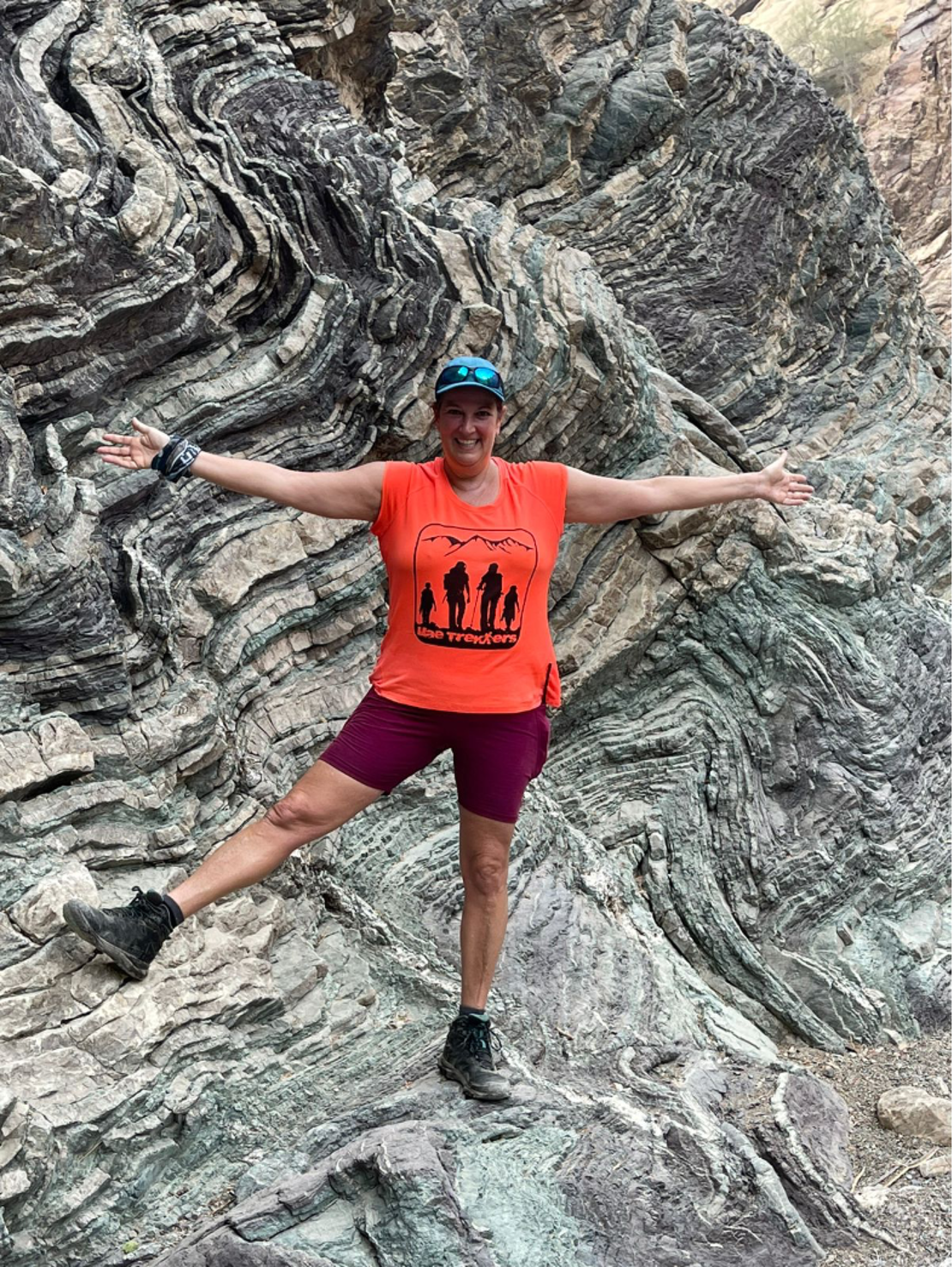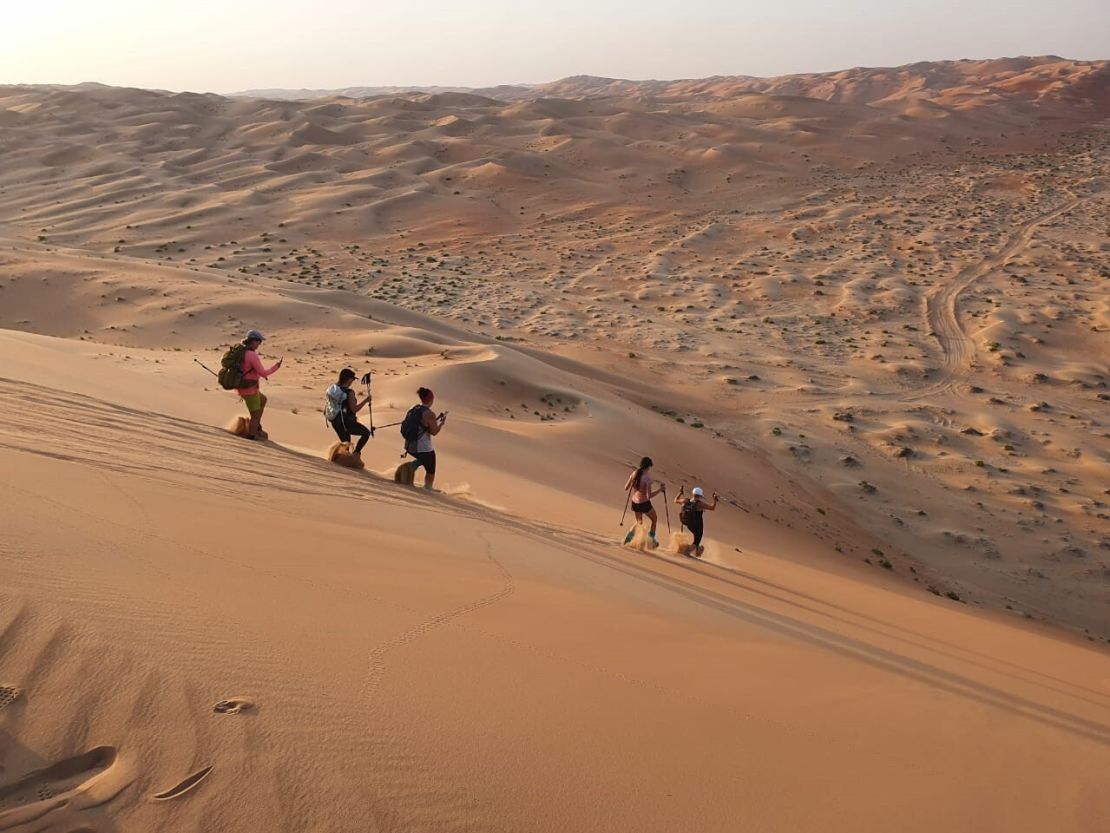Amy Subaey always had an adventurous spirit but in 2020 she embarked on her biggest adventure yet.
Born and raised in the Minnesota, she has also lived in Bahrain and Egypt and moved to Dubai, in the United Arab Emirates (UAE), in 2002. But when she was suddenly made redundant from her position as an English instructor at an energy company during the Covid pandemic, she found herself unemployed in a foreign country with her teenage daughter, and no clue in which direction to take her career.
So she decided to follow her passion.
An avid hiker and mountain climber, during her time in Dubai Subaey had struggled to find like-minded people to trek with her, so in 2011 she had started a weekend hiking group. A few years later she turned it into a business called UAE Trekkers, running weekend hikes while she continued teach English in the week.
“I knew that I wanted to create something inclusive and that encouraged people to get outside and explore what Dubai had to offer outside of the city. From there it spiralled,” Subaey says. “There’s a lot of people in Dubai, they don’t know there’s anything else outside of the city. A lot of people don’t realize that there’s so much nature here – they’re blown away.”

After losing her job in 2020, Subaey, who is now aged 55, decided to focus her energies on UAE Trekkers, which has now amassed 30,000 followers on social media and offered guided hikes to over 60,000 people.
No longer working a nine-to-five at the university, she regularly wakes up at 3:am on weekdays to lead treks around some of the most breathtaking scenery surrounding Dubai, such as the exclave of Hatta, Sharjah, Fujairah, and the neighboring country of Oman, home to Snake Canyon, a deep gorge that allows hikers to dive into its water-filled pools. She even offers a specialist sunset hike across the Liwa desert in Abu Dhabi – used as location for filming “Dune Part Two” (The distributor of which shares a parent company, Warner Bros. Discovery, with CNN.)
Subaey’s goal was always to get people out of Dubai city, into nature, and have them fall in love with hiking.
“You can’t really feel your problems when you’re in out in nature,” she says. “Just being outside in the fresh air is so peaceful, it makes me more absorbed in the present moment. I stay out for three or four hours and once I get back, I feel so refreshed.”
From the start, Subaey was determined to make a positive change, having all her hikes led by female guides.
“Our early challenges were to overcome the stereotype of what a hiking guide should look like,” Subaey says. “The stereotypical guide has physical strength and endurance and places an emphasis on hiking as a tool to improve your fitness, physique, speed and longer distances.”
Going against the grain, Subaey employed current and former educators as well as mothers, like herself, as guides. From this, UAE Trekkers developed a “student- centered” approach that caters to new hikers, from the classroom to the trails.
“Hiking tends to be a way that people can show very quickly how fit they are, or how fast they can go, and we really wanted to remove that competitive atmosphere and cater to all levels,” Subaey says.

Planning ahead
But even hikes aimed at beginners can require extensive planning.
“Most have the idea that a hike is as simple as putting on your sneakers and grabbing half a liter of water for a three-hour hike in what are usually very remote regions of the country – without cell service or access to water or shade,” Subaey says.
“It does not include things like checking the weather forecast, determining which places are risky if there is severe weather, wearing hiking boots to avoid twisting an ankle, and taking sufficient water to avoid dehydration and heat exhaustion.”
Once beginners are armed with the necessary knowledge, they’re free to venture on their own – although many choose to continue to trek with a guide.
UAE Trekkers’ certified guides provide hikers with coaching on how to prepare for treks, what to bring and how to make the most of the experience. They also educate beginners on handling emergencies while trekking – such as heat exhaustion and navigating difficult terrain – and educate trekkers about the flora, fauna, geology, history and culture of the area whilst on the trail.
Guests pay up to 275 dirhams ($75) for a specialist guided hike, snacks, juice, and hiking equipment, with beginner’s walks stretching for 9 kilometers (5.6 miles) and lasting around three hours. But what keeps guests returning, Subaey maintains, is the opportunity to connect with one another as well as nature. The multiculturalism of Dubai combined with the diverse hiking group of tourists, residents, and visitors, enables trekkers to meet others from across the globe.
“I’m constantly meeting people from everywhere, I’m constantly surprised by how far people have traveled. I think those who hike with us really relish that,” Subaey says.
“There’s definitely a sense of community in Dubai that I didn’t find in the US,” she adds. “People start talking to each other. They get to know each other. They’re meeting different kinds of people, different ages, different nationalities – it’s a stereotype that Dubai is only accessible for the uber-wealthy.”
Relishing her new career, she even plans to open a hiking retreat in Lima over the coming years.
“A lot of people don’t realize that there’s so much raw beauty here. I love seeing the look on people’s faces when they see one of Dubai’s stunning views,” she says. “It’s like my mission is complete.”

